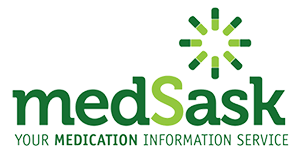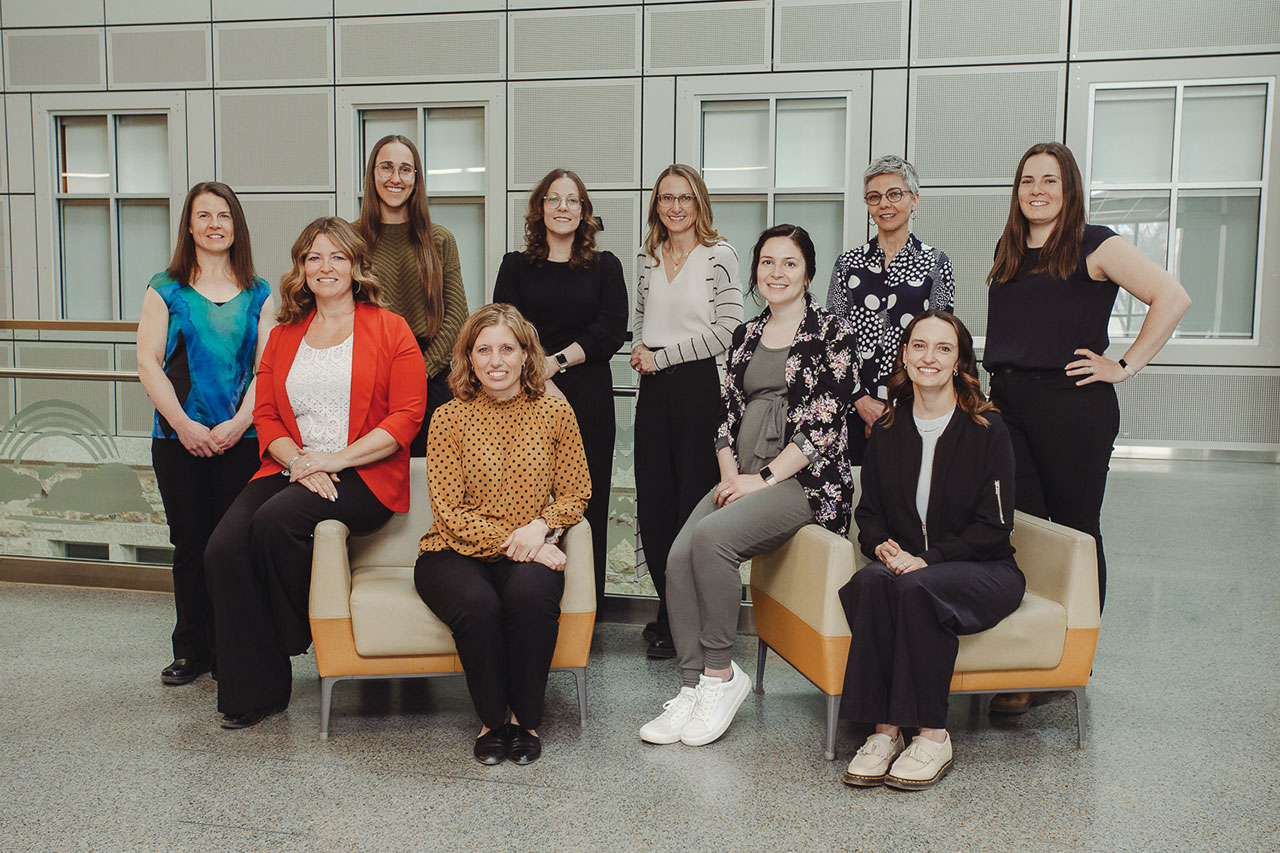Celebrating medSask

As medSask marks its 50th anniversary, we celebrate the service’s commitment to providing concise, evidence-informed health information. Since its inception in 1974, the team at medSask has provided drug and health information to the public and healthcare professionals. Operating as a service unit within the College of Pharmacy and Nutrition at the University of Saskatchewan in Saskatoon, medSask has been a vital resource for half a century, and it continues to evolve and innovate under the capable leadership of Charity Evans, PhD, Associate Dean Academic, and Danielle Larocque, BSP, Director.
 Left to right: Carmen Bell, Kerrie Bjarnarson, Olivia Moyse Statham, Charity Evans, Sara Storle, Kelly Kizlyk, Madison Bomboir, Janice Norfield, Danielle Larocque, Sara Sawin. Photo Credit: Daniel Belhumeur
Left to right: Carmen Bell, Kerrie Bjarnarson, Olivia Moyse Statham, Charity Evans, Sara Storle, Kelly Kizlyk, Madison Bomboir, Janice Norfield, Danielle Larocque, Sara Sawin. Photo Credit: Daniel Belhumeur
medSask answers 3000 questions from health care professionals and 4000 questions from Saskatchewan consumers (patients or non-healthcare professionals) on average per year.
One of medSask's unique features is its team of 17 Medication Information Consultants who are licensed pharmacists. These experts are dedicated to addressing drug and health inquiries 365 days a year through two toll-free telephone lines and email, ensuring that assistance is always within reach. The operation of medSask is made possible through funding from the Saskatchewan Ministry of Health, the Saskatchewan College of Pharmacy Professionals, license agreements for its guidelines, donations, and in-kind support from the College of Pharmacy and Nutrition. This support ensures that medSask remains an independent, and reliable source of drug and health information.
The 50th Year Event
Celebration and funding announcement
The University of Saskatchewan and the Government of Saskatchewan held a special funding announcement and celebration for medSask on Thursday, June 20, 2024 on the USask campus. At the event, it was announced that the Saskatchewan Ministry of Health is providing nearly $1M in funding to medSask this year. Following the announcement, they helped celebrate medSask's 50th anniversary of supporting healthcare in Saskatchewan.
Emcee Charity Evans, Associate Dean Academic, Hon. Everett Hindley, Minister of Health, Jim Blackburn, medSask founder, former dean College of Pharmacy and Nutrition, Arlene Kuntz, Director, Professional Practice, Drug Plan and Extended Benefits Branch, and Danielle Larocque, Director, medSask all spoke at the event.
Many attendees joined in commemorating this landmark occasion and recognized the ongoing contributions of medSask to healthcare in our communities.
medSask Now
Support for healthcare professionals
medSask plays a critical role in supporting appropriate prescribing and medication safety in Saskatchewan by offering precise, evidence-based information on medications and medication therapy. This resource is available not only to the general public but also to healthcare providers, including pharmacists, nurse practitioners, and physicians, and other collaborative partners. Advancements in medications and therapies make medication management more complex, and healthcare professionals value the opportunity to consult specialized pharmacists to ensure the best possible care for their patients.
For the general public
medSask's website is another place the public can access timely, specific drug information and pharmacist advice. The website addresses common medication concerns for the public and more complex changes to medications or services, like the Saskatchewan Biosimilars Initiative.
Often, members of the public do not know their pharmacist can prescribe for many minor ailments, helping them avoid lengthy wait times or a trip to a clinic. The medSask website educates the public about what conditions a pharmacist can prescribe for and what these services may look like.
The Future
medSask will continue to work with the Saskatchewan College of Pharmacy Professionals (SCPP) and the Ministry of Health to support the increasing scope of practice for pharmacists in Saskatchewan.
Historical Overview
The Saskatchewan Dial Access Drug Information Service
In October 1974, the College of Pharmacy launched a groundbreaking service that would become the first province-wide drug information initiative in Canada - the Saskatchewan Dial Access Drug Information Service. This pioneering venture was a collaborative effort between the College of Pharmacy and the College of Medicine, aimed at providing pharmacists and physicians across Saskatchewan with accessible, up-to-date drug information via a telephone service. The operation was supported by a network of volunteers who responded to calls via a radio pager system.
Growth and expansion
Over the years, the Dial Access Drug Information Service expanded its scope and capabilities. By 1983, the increasing demand for the service led to the hiring of the first full-time pharmacist (Cheryl Kolbinson) through a grant from the Saskatchewan Prescription Drug Program, a move supported by Saskatchewan Health, the Saskatchewan Pharmacists Association, and other organizations. This allowed the service to operate more efficiently and provide more comprehensive support to healthcare professionals.
"Access to the service was improved with the establishment of a toll-free telephone number for all Saskatchewan healthcare professionals. The Dial Access office also became home for the Consumer Drug Information Service, a toll-free telephone line for all Saskatchewan residents funded by Saskatchewan Health. Paul Melnyk served as coordinator for these services during the ‘90s," former medSask Manager Karen Jensen stated.
In 1991, the establishment of the Saskatchewan Consumer Drug Information Centre marked another milestone. This centre aimed to extend the service’s benefits to the general public, empowering consumers with knowledge about their medications and promoting safer drug use.
In 2001 the professional and consumer lines were amalgamated under the name of the Saskatchewan Drug Information Service (SDIS). Minor ailment prescribing by pharmacists now occurs nationally but it started in Saskatchewan over a decade ago, at SDIS, thanks to the progressive foresight of Jensen (SDIS manager at the time) and Ray Joubert (Saskatchewan College of Pharmacy Professionals registrar at the time). In 2014, SDIS was rebranded to medSask.
Loyal and veteran staff members
Carmen Bell will be celebrating her 20-year anniversary at medSask in July this year. In that time, Bell has answered over 24,000 healthcare professional queries. When she started, there were 2 full-time pharmacists and 1 part-time pharmacist that worked at the service. She credits the success of medSask to the people who have been involved.
"By far what stands out the most are the colleagues I've worked alongside. I've been fortunate to be surrounded by people who are brilliant, passionate, and just really good human beings. My original manager, Karen Jensen, was a true visionary with unprecedented dedication. This exemplary leadership has continued with our current leaders, Charity Evans and Danielle Larocque, who have somehow managed to grow our team four-fold in just a few years. Every person on our team puts our end user first (the person on the other end of the call, the pharmacy professional using one of our tools, etc.). The unique skillset, experience, and personality of each of us has married into the most outstanding team one could assemble."
The Visionary Behind Dial Access
Dr. Jim Blackburn

Dr. Jim Blackburn, a pioneering figure in Canadian pharmacy, was the founding Director of what came to be known as Dial Access. His vision and leadership were instrumental in establishing this groundbreaking drug information service. Additionally, Dr. Blackburn served as the Dean of the College of Pharmacy and Nutrition from 1982 to 1997, further cementing his legacy in the field.
Dr. Blackburn’s inspiration for Dial Access was deeply rooted in his extensive experience in the United States. During his tenure at the University of Iowa, he became acquainted with their drug information system. Later, at the University of Minnesota, he was involved in organizing recorded articles for an information service, experiences that would significantly shape his future endeavors.
In 1974, Dr. Blackburn returned from Minnesota and began teaching Clinical Pharmacy at the University of Saskatchewan. At that time, the College was housed in the historic Thorvaldson building. Recognizing the potential to improve drug information dissemination, a Drug Advisory Committee was formed, and Dr. Blackburn was tasked with developing a pilot project.
On September 15, 1974, the Dial Access service was inaugurated. It was a unique program in Canada, combining drug information and a telephone tape library into a single, comprehensive service. The initial response was modest, with the service receiving only one call a day, however, it quickly gained momentum. In its first year, Dial Access received 450 calls, averaging about 35 calls per month. These inquiries came from physicians, hospital staff, and community pharmacists.
Reflecting on the service’s evolution, Dr. Blackburn highlighted two key aspects that underscored its success.
“The sheer number of individuals helped is remarkable. From 450 calls in the first year, it grew to over 7000 calls annually. The technological advancements are also impressive. Initially, callers used rotary phones and we started with a single pager, necessitating a callback to initiate assistance. It’s astounding how far we’ve come,” said Blackburn.
This initiative also marked the beginning of a fruitful collaboration between the College of Pharmacy and the College of Medicine. It fostered a synergistic work environment, harmonizing the educational streams of both colleges.
Dr. Jim Blackburn’s vision and dedication not only established a vital resource for healthcare professionals in Saskatchewan but also paved the way for future innovations in drug information services. His legacy continues to inspire and influence the field of pharmacy to this day.
Published: June 24, 2024
By: Jason Belhumeur | Communications and Alumni Relations Specialist
Pharmacy and Nutrition, University of Saskatchewan


